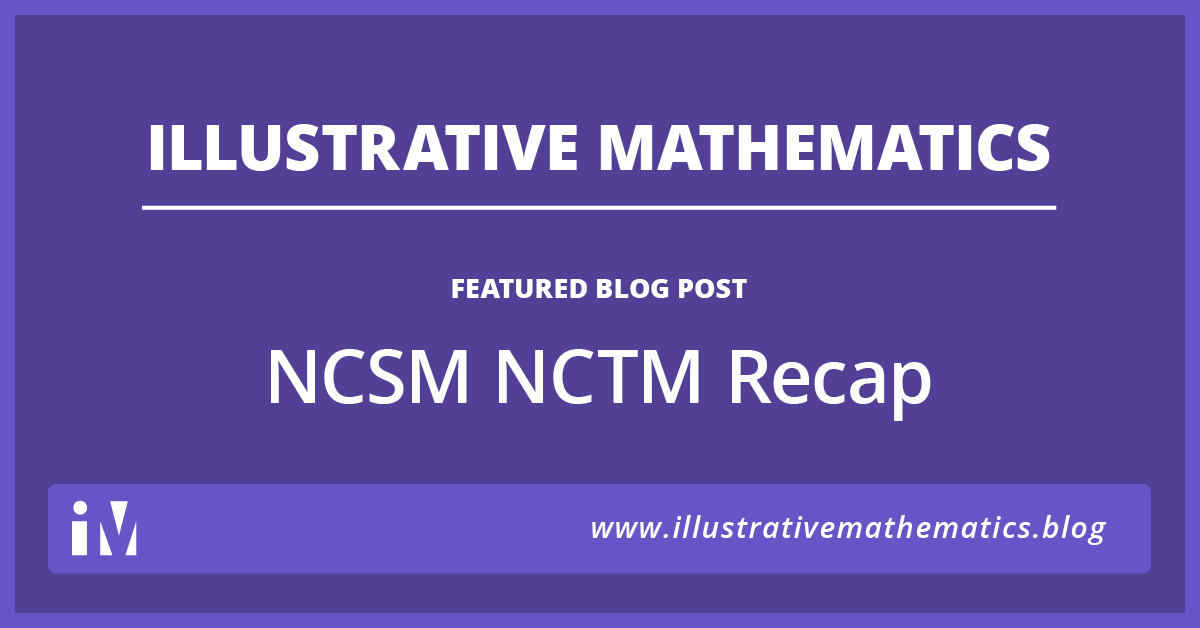Illustrative Mathematics
It was great to see so many of you at NCSM and NCTM in San Diego. If we missed you, or you weren’t able to attend, read our NCSM and NCTM round-up below.
We enjoyed the conversations we had with those of you that are using the IM 6–8 Math curriculum and are looking forward to the upcoming release of IM Algebra 1, Geometry, Algebra 2 (July 2019) and IM K–5 Math (2021).
Check out some photos and all of the IM presentations below, including Bill McCallum’s The Intersection of Curriculum, Instruction, and Technology: Lessons Learned from Implementing and Piloting Illustrative Mathematics’ Curriculum.
Which presentations did you attend and which was your favorite?
Some of the @IllustrateMath team at Day 1 of #NCSM2019 #NCSM19 @dionnedance @wgmccallum @math_marni @kevinliner @jwilson828 pic.twitter.com/40cMyOdqDX
— Kristin Gray (@MathMinds) April 2, 2019
IM sessions from NCSM 2019
William McCallum and Nancy Smith
The Intersection of Curriculum, Instruction, and Technology: Lessons Learned from Implementing and Piloting Illustrative Mathematics’ Curriculum
This session discussed how curriculum, instruction, and technology should work together to meet the need of all learners. But what does this look like in a secondary classroom? How does a problem-based curriculum provide authentic opportunities for students to use technology tools? Bill McCallum of Illustrative Mathematics, Corrine Williams of Evergreen Public Schools, and Eric Westendorf of LearnZillion brought the lenses of mathematics, instructional leadership, and technology to examine these questions.
Overarching curriculum structure of @IllustrateMath 6-12 …and soon to be K-5! @wgmccallum talk at #NCSM19 pic.twitter.com/OzZR57y6yP
— Kristin Gray (@MathMinds) April 1, 2019
Jody Guarino and Kristin Gray?
Coach Using Purposeful Math Routines from Illustrative Mathematics K-5 Curriculum
Do you support teachers who currently use or want to learn how to use mathematical routines to enhance student learning? This session explored a developmentally and mathematically appropriate trajectory of routines that support students in making their thinking explicit.
Kristin Gray, Marni Greenstein, Dionne Samb, and Shelbi Cole
Coaching for Content: The Top 3 Elementary Math Topics That Must be Taught Differently
Since states committed to college- and career-ready standards, we have seen instructional shifts that get to the heart of many mathematical topics. There are particular topics, however, where our approaches have not changed to match the intent of the standards. This session provided insight into common alignment issues for three important elementary mathematics topics, the intent of the standards, and ways to support teachers in developing the mathematical content knowledge necessary to shift their instruction.
Checking out the awesome view from the #LearnWithIM Kendall Hunt reception. @datmathlady pic.twitter.com/v6RQuBbLjd
— Tina Cardone ???? (@crstn85) April 5, 2019
Kevin Liner and Jeff Crawford?
Ensuring Equity with LearnZillion’s publication of the Illustrative Mathematics 6–8 Math Curriculum
This session focused on how the Illustrative Mathematics curriculum engages all students in the exploration and comprehension of mathematical concepts. Kevin Liner and Jeff Crawford investigated how mathematical language and content routines provide equitable access for all learners throughout the problem-based curriculum. The session demonstrated how LearnZillion’s digital platform provides efficient structure and tools for teachers to cultivate rich classroom conversations provided by the architecture of the Illustrative Mathematics curriculum.
Color coordinated with my co presenter! @dionnedance pic.twitter.com/hqY3b2Kvbo
— Marni Greenstein (@math_marni) April 2, 2019
IM sessions from NCTM 2019
?Gabriel Rosenberg and Tina Cardone
Levels of Rigor in Proofs Using Transformations
This session allowed attendees to experience a sequence of activities from Illustrative Mathematics that moves students from hands-on experimentation to strategy games to formal proof of SAS, ASA, and SSS using transformations. Gabriel Rosenberg and Tina Cardone broke down the learning trajectory of proof with transformations and discussed the level of rigor that is appropriate for transformation proofs.
Jennifer Wilson and Vanessa Cerrahoglu
Cultivating Agency, Mathematical Understanding, and Language through Math Language Routines
“Mathematics is no more computation than typing is literature”—Paulos. How might we support students in developing a shared vision? This session considered how Math Language Routines both create a need for students to converse with others about math and empower students to share their thinking around mathematical ideas in ways that foster understanding.
Kristin Gray and Jody Guarino
Illustrative Mathematics K–5 Curriculum: Using Purposeful Math Routines
Do you currently use or want to learn how to use math routines to enhance student learning? This session explored a developmentally and mathematically appropriate trajectory of routines that support students in making their thinking explicit. Attendees left with ideas that can be implemented in the classroom, including a set of routines and strategies for implementation.
Love presenting with @jody_guarino bc she does the best work with these routines! #NCSM2019 #LearnWithIM pic.twitter.com/ua0ZwCKwUo
— Kristin Gray (@MathMinds) April 2, 2019
William McCallum
Taking Modeling Seriously in the High School Curriculum
There has long been wide agreement that students in high school should have an opportunity to apply mathematics to problems in our world requiring research, strategy in choosing models, and interpretation of results. In this presentation, we describe how this recommendation has been implemented in the Illustrative Mathematics high school curriculum.
Jen Silverman and John Golden
Transforming HS Geometry with GeoGebra: Featuring Activities from Illustrative Mathematics Geometry
New standards have given high school geometry a fresh start. Dynamic geometry software allows activities with more opportunities for exploration and greater accessibility than traditional exercises. In this workshop, we will explore brand-new Illustrative Mathematics high school geometry activities using GeoGebra. Bring a laptop or tablet to join the fun.
Vanessa Cerrahoglu, Sadie Estrella, and Craig Schneider
Mathematical Language Routines: Developing Students’ Voices and Sense Making
This session featured mathematical language routines that support sense making and foster equity and access for all students. These routines help amplify, assess, and expand students’ mathematical language and understanding. Attendees engaged in scaffolded routines that are flexible to support varied topics, grades and classroom environments.
Dionne Aminata Samb before her presentation at #ShadowCon19.
